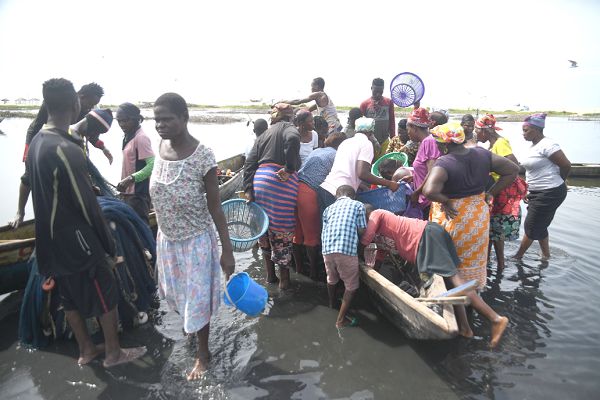
Bumper harvest for oyster pickers
Harvesting and selling of oysters is a major source of livelihood for many people in communities along the Densu Delta, notably Tsokomey, Bortianor and Tetegu, all in the Ga South municipality in the Greater Accra Region.
They are harvested by simply gathering them from the river beds. In very shallow waters, they can be gathered by hands or with small rakes. In somewhat deeper waters, long-handled rakes or oyster tongs are used to reach the beds.
Oysters are a great source of protein and are also extremely rich in zinc, which is essential for testosterone production and maintenance of healthy sperm. Although women have much less testosterone than men, it also plays a key part in the female libido. Oysters also boost dopamine, a hormone that increases libido in both men and women, according to John Staughton, co-founder of ltineray Journal and Turek Clinic in Los Angeles in the USA .
However, in the last five years, Ghana’s oyster population has declined significantly owing to an increasing number of harvesters . The oysters are harder to find and harvesters are seeing sizes of their collected oysters getting smaller and smaller.
Closed season
To arrest the situation, the harvesting of fish in the Densu Delta was closed in November 2018 to allow for the regeneration of the sea food to boost yields.
The closed season, the second in two years, was undertaken by the Development Action Association (DAA), a non-governmental organisation, in collaboration with the Densu Oyster Pickers Association (DOPA),with a membership of 150 women, under a sustainable oyster fishery management plan.
Their decision was based on scientific data which allowed time for the oyster to spawn and grow bigger.
Great joy was brought to fisher folk who depend on the river for their livelihood last week when the closed season was declared opened after five months.
Reopening
A ceremony to mark the reopening season was held at the Tsokomey Landing Site, near Kokrobite, on the theme: “Community co-management — Paving the way for effective national resource and sustainability”.
The first closed season was observed last year, and according to members of DOPA, it led to a massive boost in oyster yields.
They said although the decision to ground their tools for the second time in two years was a difficult one, the successes recorded after last year's closure informed their sacrifice.
They, therefore, expressed confidence that the second opening season would lead to a bumper harvest to compensate for the long wait.
“The closed season was a great opportunity for us. When harvesting resumed, I made GH¢80 a day. That was not possible before, ” Bernice Agorogo, a member of DODA, claimed.
The closed fishing season was supported with funds from the United States Agency for International Development (USAID) under a Sustainable Fisheries Management Project (SFMP).
The SFMP, a five-year initiative being implemented by the Coastal Resources Centre of the University of Rhode Island, USA, in collaboration with the Fisheries Commission, is aimed at transforming the artisanal fisheries sector and rebuilding stocks.
As part of the initiative, members of DOPA were trained on how to adopt a science-based approach in their harvesting activities to maximise yields, oyster habitats and reproduction.
